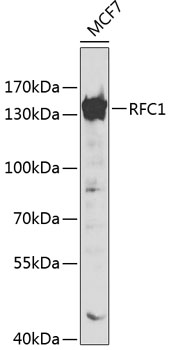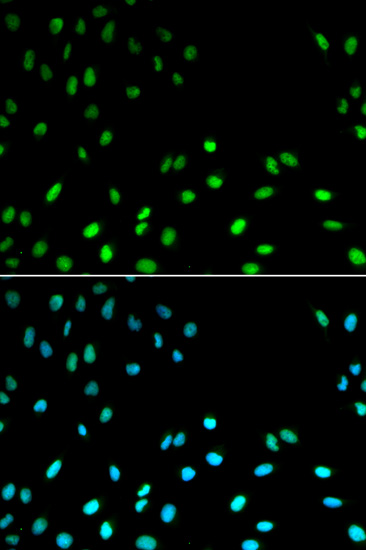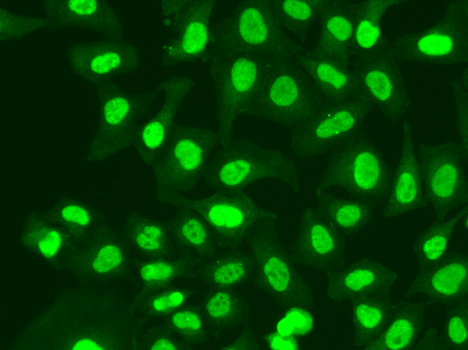-
Product Name
RFC1 Polyclonal Antibody
- Documents
-
Description
Polyclonal antibody to RFC1
-
Tested applications
WB, IF
-
Species reactivity
Human
-
Alternative names
RFC1 antibody; A1 antibody; MHCBFB antibody; PO-GA antibody; RECC1 antibody; RFC antibody; RFC140 antibody; replication factor C subunit 1 antibody
-
Isotype
Rabbit IgG
-
Preparation
Antigen: Recombinant fusion protein containing a sequence corresponding to amino acids 400-700 of human RFC1 (NP_001191676.1).
-
Clonality
Polyclonal
-
Formulation
PBS with 0.02% sodium azide, 50% glycerol, pH7.3.
-
Storage instructions
Store at -20℃. Avoid freeze / thaw cycles.
-
Applications
WB 1:500 - 1:2000
IF 1:50 - 1:200 -
Validations

Western blot - RFC1 Polyclonal Antibody
Western blot analysis of extracts of MCF-7 cells, using RFC1 antibody at 1:500 dilution.Secondary antibody: HRP Goat Anti-Rabbit IgG (H+L) at 1:10000 dilution.Lysates/proteins: 25ug per lane.Blocking buffer: 3% nonfat dry milk in TBST.

Immunofluorescence - RFC1 Polyclonal Antibody
Immunofluorescence analysis of MCF-7 cells using RFC1 antibody . Blue: DAPI for nuclear staining.

Immunofluorescence - RFC1 Polyclonal Antibody
Immunofluorescence analysis of A549 cells using RFC1 antibody .
-
Background
The elongation of primed DNA templates by DNA polymerase delta and epsilon requires the action of the accessory proteins PCNA and activator 1. This subunit binds to the primer-template junction. Binds the PO-B transcription element as well as other GA rich DNA sequences. Could play a role in DNA transcription regulation as well as DNA replication and/or repair. Can bind single- or double-stranded DNA.; Interacts with C-terminus of PCNA. 5' phosphate residue is required for binding of the N-terminal DNA-binding domain to duplex DNA, suggesting a role in recognition of non-primer template DNA structures during replication and/or repair.
Related Products / Services
Please note: All products are "FOR RESEARCH USE ONLY AND ARE NOT INTENDED FOR DIAGNOSTIC OR THERAPEUTIC USE"
